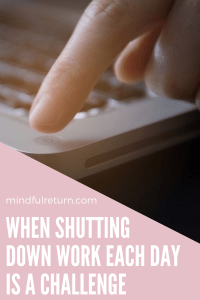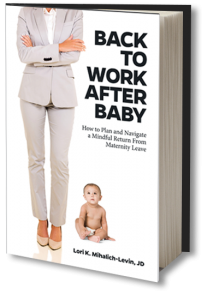 If I’m being honest, I can admit that shutting down at night has been a perennial challenge for me. Not just a COVID-related struggle. The recovering perfectionist in me has trouble with loose ends. Un-finished to-do lists. And things out of my control.
If I’m being honest, I can admit that shutting down at night has been a perennial challenge for me. Not just a COVID-related struggle. The recovering perfectionist in me has trouble with loose ends. Un-finished to-do lists. And things out of my control.
I got better at the end-of-the-office-workday shutdown when my kids were at daycare, and I had to pick them up (or risk paying those pesky $10/minute late fees). But I’ve still struggled mightily with the when-to-turn-off-at-night question.
I’ve written before about finding the split-shift incredibly helpful to my career and business. That is, going back to work for a few hours after our kids are asleep. For me, and for many, COVID has made this split-shift concept not only a nice-to-have but an essential element of maintaining a job and career.
The more and more parents I talk to and coach, though, the more I’m reminded this isn’t a “me” problem. “Work-life mush” as I’ve been calling it has invaded everyone’s lives. Those with children and those without.
A few weeks ago, conscious of the effect a lack of sleep was having on my mood and ability to function, I recommitted to finding a way to make shutting down work.
4 Steps to Shutting Down Work
Here’s what’s been working for me in setting effective shut-down boundaries. Yes, even when the to-do list scrolls on and on and on…
- Defining My Values – My “Why” of Shutting Down: I’ve found it helpful to reflect on the question of why exactly I need to shut down. Especially when many voices in my head (and seemingly screaming emails) are telling me otherwise. For me, my “why” is my physical and mental health. As many leaders in the working parent space have noted, there are glass balls that will break if we drop them, and there are rubber balls that will simply bounce back up to us tomorrow if they drop. Health is glass, and work is rubber.
Just as importantly, I’m motivated by the knowledge that given feelings and moods are contagious within a household, my emotional stability is critical to my kids’ emotional self-regulation. Plus, I know I’m clearer-headed and more efficient in my work if I get at least 7 hours of sleep.
- Picking a Time and Communicating It to Someone (Anyone!) Else: Choosing a shutdown time is helpful in creating ritual and routine, which I find comforting. But choosing it wasn’t enough for me. For a long time, I would simply blow through that committed-to time. And then I’d be sleepy, cranky, and mad at myself later. Communicating the shut-down time to my husband has helped keep me honest. He doesn’t say anything if I pass that time, but there’s something about having committed to him that I’m done at 10:30pm that keeps me way more honest about it.
- Planning an Enjoyable Activity That’s Meant to Occur at Shut-Down Time: Another amazing motivator for me to shut down right at 10:30pm has been planning something I want to do that will occur at that time. My husband and I realized over the summer that we would both benefit from some daily guided meditation time, and that we’d enjoy doing that together. So now, when we shut down at the designated hour, we sit and listen to a 10-minute guided meditation by Sharon Salzberg on Insight Timer, my favorite (and free!) meditation app. I’ve also been teaching him a few yoga poses at this time, which is something we’d been meaning to do together but never got around to. Maybe for you, the enjoyable activity is reading a book for 10 minutes, or taking a bath. Whatever it is, it should be something you look forward to and know will be restorative for you.
- Noting the Effects of Shutting Down: It helps, I find, to pay attention to how I feel after I’ve honored my own commitment to shutting down. Yes, I still struggle with the undone to-dos. But if I reflect honestly, particularly in the morning after a longer night of sleep, I can take note of the fact that I’m better-rested. Clearer-headed. And in a better mood. Experiment with a shut-down boundary for a night or two. And then ask yourself, “how do I feel?” “Did the sky cave in because I turned everything off at a specific time?”
Another strategy I’ve used from time to time has been a shutdown mantra. Something to tell my brain that the time has come to close the world of work. I got this idea from Cal Newport, author of Deep Work: Rules for Focused Success in a Distracted World, who uses the phrase “schedule shutdown, complete” to end his work sessions. More of his great work-shutdown ritual ideas are here.
Shutting Down and Chronic Burnout
We’ve all been through periods when we knew that for a few weeks, we’d need to work as hard as our bodies allowed. We simply pushed through. Got the work done. And survived on little sleep or energy.
In case you haven’t noticed, this strategy does not work for the COVID marathon. I saw a social media post the other day of a lawyer who posted a selfie. It was a photo of herself in a hospital bed, being pumped with fluids. She was begging anyone who saw her picture to please stop and take care of themselves. She had driven herself to dehydration and burnout, and she’s not alone. Her post offered the excellent reminder that there is no career to push yourself in, if you don’t have the health to have your career.
That darn to-do list will always be there. Tomorrow, and the next day, and the next. Until you’re in your 90’s probably. These daily shut-down boundaries are so very worth setting.
If you’d like to dig deeper into subject of boundary-setting, both for ourselves and for our children, please join me and parent educator Paige Trevor for a webinar, “Navigating E-Learning and Boundaries as a Working Parent,” on Thursday, October 8, from 1-2pm Eastern. Access a replay here.
Want more practical tips on working parenthood? Check out my book, Back to Work After Baby: How to Plan and Navigate a Mindful Return from Maternity Leave



